It was such an interesting session this evening. Thank you, Mr. Howard Osa for an enlightening session on Boeing and leadership.
Join us tomorrow as we learn about NHK and the documentary industry with Ms. Yoko Imai.
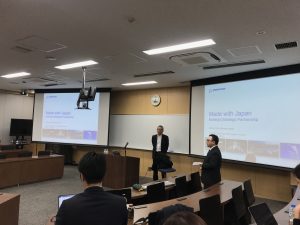
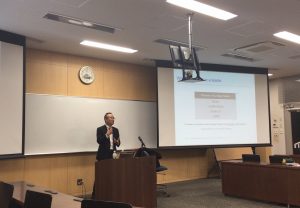
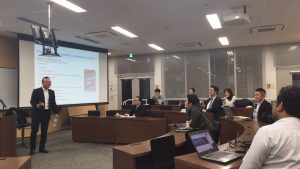
Prof. Maswana presented at the Western Economic Association International (WEAI) 92nd Annual Conference (June 25-29, 2017, San Diego, CA, USA, http://www.weai.org/AC2017 ) on the topic “Technology-Intensive Trade Performance and Economic Growth: a re-examination of the empirical evidence for African countries”. Based on the Augmented Solow’s growth model and using System-GMM Panel Estimator, the results show that, contrary to numerous claims elsewhere, trade in more technology-intensive industries implies a greater potential for sustained economic growth rates. This finding implies that simply increasing the volume of exports may have been a necessary igniter of economic growth thus far, but it may not be a sufficient driver of long-run economic growth for Low-income African economies. The paper will be published in the Contemporary Economic Policy Journal.
Dr. Aki Tonami (Associate Professor of International Relations and Economics) has published a new article in the Third World Quarterly. Third World Quarterly (2016 Impact Factor 1.156) is the leading journal of scholarship and policy in the field of international studies.
"Exporting the developmental state: Japan's economic diplomacy in the Arctic"
Japan remains a developmental state where the state guides and oversees economic development, and the strong bureaucracy and businesses in turn complement each other in leading and shaping policies to achieve developmental goals. Japan retains the institutions deemed necessary to enhance the cooperative behaviour of the bureaucracy, businesses and politicians, and norms about what is important in order for an interventionist state to implement policies aimed at achieving economic development and the autonomy of the state. Externally, Japan has practised economic diplomacy with tools such as development assistance to achieve its economic security and to promote the developmental state model abroad. The process of making foreign policy contextualised and reinforced the norms, for both Japan's domestic and international audiences. Japan today tries to promote science and technology as a main catalyst for creating industries and supporting its domestic, export-oriented economy. This is based on Japan's own interpretation of its historical path and economic success and is also used to justify its engagement in the Arctic, a region where Japan does not have any sovereign territories. Japan's Arctic policy is as an extension of its economic diplomacy and an attempt to export the Japanese developmental state model.
Keywords: Japan, developmental state, economic diplomacy, science and technology, the Arctic
English Test Scores: Entrance Examination for AY2019 April Enrollment
MBA Program in International Business will evaluate the applicants’ English proficiency based on submitted TOEIC, TOEFL or IELTS (Academic) scores. The official score taken within the past 2 years (no earlier than October 2016) will be accepted. Those who haven't taken an English proficiency test, please schedule to take the test by the end of July 2018.MBA Program in International Business Graduate School of Business Sciences University of Tsukuba
What a way to start 2018!
We had the pleasure of having to learn about the OTT industry, sports broadcasting as well as product management from Mr. Bartos of DAZN.It was a very eye-opening and engaging session. Our heartfelt thanks to Mr. Bartos.
The next session will take us to understanding Japanese media trends and communication design with Mr. Hideyuki Kondo from Hakuhodo DY Media Partners.
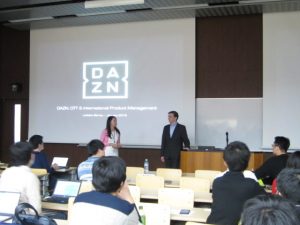
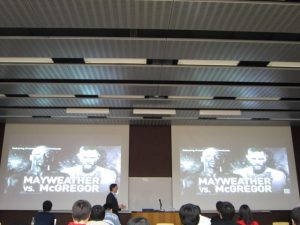
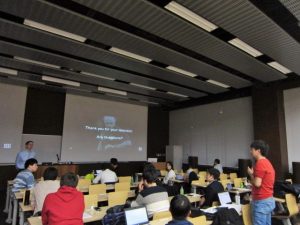
Below are the students whose outstanding business project while at MBA-IB received the Provost Award. The topics that MBA-IB students cover in their research is as diverse as their backgrounds. Congratulations!
How to increase purchase intention in cosmetic CRM campaigns
Battery Management ICs - Why we need it and how to market it successfully?
Factors to motivate local staff for developing self-autonomy in emerging countries based on the self-determination theory model of work motivation
[ Abstract ]
Along with the advancement of globalization, the delegation of tasks and authority to local staff of multinational firms has become an inevitable issue for many multinational companies and organizations for their subsidiary management. According to the motivation management perspective espoused by the Self-Determination Theory (SDT) of Work Motivation (Gagné, M. and Deci, E., 2005), self-determination is one of the key factors for improving the performance of local staff by promoting their potential knowledge, skills, and competencies. This study identifies the factors that contribute to local staff’s work motivation, which are hypothesized to affect their organizational commitment, job satisfaction, and performance. A structural equation model was used to analyze 272 samples from four emerging regions (Southeast Asia and Oceania, South Asia, Latin America, and Africa). The results indicate that there are common and idiosyncratic factors among regions that contribute to the primary (work motivation) and secondary (performance appraisal, organizational commitment, and job satisfaction) dependent variables. Suggestions for improving the motivation management of local staff of multinational firms in emerging countries are discussed based on this empirical study.
Entry strategy of a large Japanese company into an emerging market
A study on optimal generation mix with expansion of renewable energy
The change in work motivation and favorable job characteristics throughout the lifespan: A case of back-office workers in japan
Analysis of competitive ingredient branding strategies in a supply chain
Business strategies for skincare products in Thailand